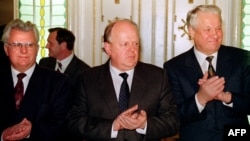On April 21, Chinese Ambassador to France Lu Shaye told French television that the former republics of the Union of Soviet Socialist Republics (USSR), aka Soviet Union, had not been recognized as sovereign states:
"These ex-USSR countries don't have actual status in international law because there is no international agreement to materialize their sovereign status."
That is false.
The international community, including the PRC, recognized the sovereign statehood of the former republics of the Soviet Union, and those 15 countries are members of the United Nations. The Western democracies never recognized the Soviet Union’s annexation of the three Baltic states in the 1940s.
International community recognizes former Soviet republics as independent states
On December 8, 1991, the heads of states of three Soviet republics - Belarus, Russia and Ukraine - met in the village of Viskuly, Belarus, and signed the Belovezha Accords, which dissolved the Soviet Union:
“We, the Republic of Belarus, the Russian Federation (RSFSR), Ukraine, as the founding states of the USSR that signed the Union Treaty of 1922, hereinafter referred to as the High Contracting Parties, state that the USSR as a subject of international law and geopolitical reality ceases to exist.”
The People's Republic of China quickly recognized the independence of all the former republics of the Soviet Union and established diplomatic relations with them.
The website of the Ministry of Foreign Affairs of the People's Republic of China states:
“In September 1991, on the second day after the Soviet Union recognized the independence of the three Baltic states of Estonia, Latvia, and Lithuania, Foreign Minister Qian Qichen sent telegrams to the foreign ministers of these countries, recognizing their independence.
…
By the end of 1991, the Union of Soviet Socialist Republics finally disintegrated, and its 15 republics became independent countries. In observation of the principle of non-interference in the internal affairs of other countries and of respect for the choice made by people of other countries, China quickly entered into diplomatic relations with these newly independent countries.”
While the three Baltic states, Lithuania, Latvia and Estonia, were under Soviet occupation from 1940 to 1991, Western countries had never recognized them as de jure republics of the USSR.
The same position was adopted by the Baltic governments themselves, the United States, the European Parliament, the European Court of Human Rights and the U.N. Human Rights Council.
Indeed, on January 13, 1983, the European Parliament adopted a resolution stating that the Baltic states were not Soviet republics but independent states under occupation:
“[T]he Soviet [annexation] of the three Baltic States has still not been formally recognized by most European States and the USA, Canada, the United Kingdom, Australia, and the Vatican still adhere to the concept of the Baltic states.”
The European Parliament approved a resolution on May 24, 2007, stating that “the Soviet occupation and annexation of the Baltic States was never recognized as legal by the Western democracies.”
Former Soviet republics join the U.N.
According to Rebecca Richards, lecturer in international relations at Britain’s Keele University, “a territory essentially becomes a sovereign state when its independence is recognized by the United Nations. As the largest and most inclusive multilateral organization, its sanctioning of sovereign statehood makes sense.”
Admission to the U.N. proves that a state has an internationally recognized independent status. According to U.N. rules, the adoption of a new country must be unanimously supported by the U.N. Security Council's five permanent members and two-thirds of the U.N. member nations:
“The Security Council considers the application. Any recommendation for admission must receive the affirmative votes of 9 of the 15 members of the Council, provided that none of its five permanent members — China, France, the Russian Federation, the United Kingdom of Great Britain and Northern Ireland, and the United States of America — have voted against the application.
If the Council recommends admission, the recommendation is presented to the General Assembly for consideration. A two-thirds majority vote is necessary in the Assembly for admission of a new State.”
Two Soviet republics, the Ukrainian Soviet Socialist Republic (now Ukraine) and the Byelorussian Soviet Socialist Republic (now Belarus), along with the USSR, were among the U.N.’s founding members in June 1945.
The remaining 12 former Soviet republics were admitted to the U.N. from September 1991 to July 1992.
On April 24, 2023, a Chinese Foreign Ministry spokesperson, Mao Ning, said “China respects the sovereign status of the former Soviet countries after the dissolution of the Soviet Union.”
The Chinese Embassy in France issued a statement saying Ambassador Lu Shaye's comments "were not a political declaration but an expression of his personal views".





